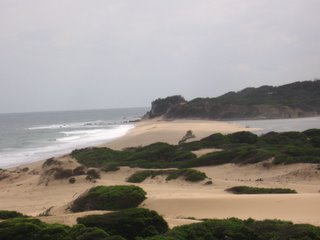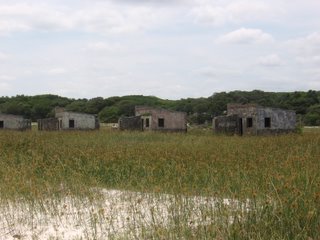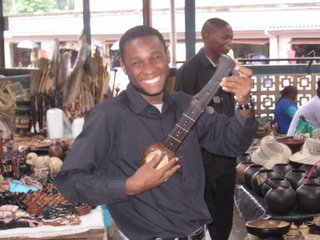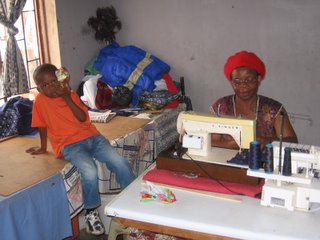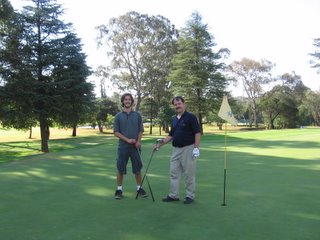No Direction HomeI received a wonderful gift from my parents for Christmas this year. Actually, the package they sent, back in the middle fo November, never actually got here until two weeks after Christmas. Such timeframes you come to accept when waiting for things in this country. Now you may already know the intensity of a mother's love for her only son but my mother takes this a step further. She loves to send me packages while I'm abroad containing various, and sometimes embarrassing, objects to remind me of home. This year she sent Christmas chocolates, a goofy looking Santa hat, a jar of Planter's nuts, a stick of Gillette deoderant and two pairs of colourful and ridiculous boxer shorts. Just imagine the customs guard's face when I had to open up my package in front of him and try and explain the contents.
One of the gifts that they managed to get to me prior to Christmas, through special delivery from Pierre while he was in Canada for a MEDA conference, was the Martin Scorsese documentary
No Direction Home. This is a four hour biography of the definitive years in the musical career of Bob Dylan. Now as many of you may know, I have been a tremendous fan of Dylan's music since I was 14 or 15 years old. I can distinctly remember being turned on to Dylan at amateur high school coffee houses, late night sessions with the oldies radio station and sitting on the steps of my former elementary school singing "Like a Rolling Stone" at the top of my lungs with my friend Andrew.
What captivated me about Dylan, even at that young age, was his ability to deliver a message through music that was poignant and challenging, ringing out like a fire bell on a silent street. Songs that always grabbed me were early Dylan folk tunes such as
Blowin in the Wind, The Times they are a Changin, Hard Rain a Gonna Fall, Only a Pawn in their Game and With God on our Side. You can find the lyrics to these songs and nearly every other Dylan song ever recorded at
slopbucket.com, an extremely useful Dylan fan site. His politically driven, socially motivated and hard hitting folk music was the stuff that really spoke to my soul. I thought that the movie did an excellant job of portraying Dylan's transformation from this stage in his career to his electric, more experimental phase.
Now don't get me wrong, I certainly appreciate this side of Dylan as well (and I LOVE
The Band). However, I do prefer the one man on stage, axe strung on his shoulder, tell the world the way it really is side of Dylan. It's just an honest preference. The man had such a big part of the western world watching his every move, waiting for his next song, and hanging on every word that came from his mouth on the stage. But the man that literally had the attention of the world stepped away from the microphone, backed away from the spotlight and cast off the media given title of the "voice of a generation." I know that he had his reasons, as we all have our reasons I suppose. Still I cannot help but feel a touch of disappointment for a man whose music could have made a greater difference in the world. There is a wonderful exchange in the movie between Dylan and Joan Baez, two folk powerhouses in the early 1960s that took very differant paths. The latter belting out protest songs and attending countless sit-ins, rallies and demonstrations even to this day while the former content to live and walk away from the crowds all in the name of creative freedom.
Bob, I admire you as a musician and as a poet but I do believe that you neglected a powerful role that had been granted to you. I think Baez raised an interesting question in the movie: what would have happened if her and Dylan had continued as an international political folk super couple? How would the last 40 years have been different in politics and music? I found it interesting that she, full of nostalgia and persistent idealism, still held a desire for that historical scenerio.
I guess I question Dylan's motives slightly when I look at the drastic change in his art through the mid 60s and after. I would not have joined the crowds that booed Dylan off the stage when he walked out with an electric guitar in his hands but I do believe that his music lost an edge, and that distinctive poignancy, during this period. I can sort of explain what I mean by looking at Dylan's relationship with my present country of residence. In 1974-75 Dylan visited sunny Mozambique and wrote the following song for his Desire album,
I like to spend some time in MozambiqueThe sunny sky is aqua blueAnd all the couples dancing cheek to cheekIt's very nice to stay a week or twoThere's lots of pretty girls in MozambiqueAnd plenty time for good romanceAnd everybody likes to stop and speakTo give the special one you seek a chanceOr maybe say hello with just a glanceLying next to her by the oceanReaching out and touching her handWhispering your secret emotionMagic in a magical landAnd when it's time for leaving MozambiqueTo say goodbye to sand and seaYour turn around to take a final peakAnd you see why it's so uniqueTo be among people living freelyUpon the beach of sunny MozambiqueNow this is a nice and happy song and I can tell you that parts of Mozambique really look and feel like this picture that Dylan paints. But come on Bob, while you were writting this song the country that surrounded you was in the peak of its war of independence. You could have wrote a song that would have told the world about the struggles of
FRELIMO and inspired the hungry and the destitute in Mozambique. Instead you came for a vacation, wrote a quick song, and left. It's not my place to judge but I guess I expected a bit more. Just some thoughts. Anyone agree or disagree?



